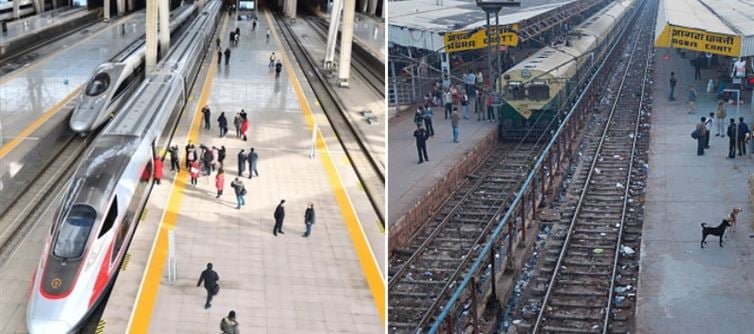
“We don’t have a population problem. We have a responsibility problem.”
Every time a debate about India’s civic hygiene begins, someone inevitably shrugs and says, “What do you expect with 146 crore people?” It’s the most convenient lie we’ve told ourselves — a shield to hide incompetence, corruption, and a deep lack of civic accountability.
Because if sheer population were the problem, China — with 141 crore people — should have been drowning in filth by now. Instead, their public spaces function with clockwork precision, while our railway stations often resemble open garbage dumps with people stepping around, neglect that’s become normal.
The difference isn’t numbers.
The difference is systems, discipline, and the will to enforce them.
🧱 1. population Isn’t the Problem — Excuses Are
For decades, india has used its vast population as the perfect scapegoat. It’s the excuse that saves politicians from scrutiny, administrators from accountability, and citizens from self-reflection.
But here’s the truth: a billion people don’t automatically mean a billion piles of garbage.
The problem lies in how our cities and systems are run. Municipal contracts for cleaning, waste collection, and maintenance exist — but they are either poorly executed or barely monitored.
When public toilets stink, platforms overflow with litter, and bins are left unemptied for days, it’s not because there are too many people. It’s because no one fears consequences for negligence.
🧹 2. china Proves What Strong Systems Can Do
China’s population is only a few million short of ours. Yet, their train stations gleam, their subways sparkle, and their streets maintain order even in dense cities like shanghai and Beijing. Why?
Because rules aren’t suggestions — they’re mandates.
Because contracts are monitored, fines are real, and civic pride is cultivated.
Their cleanliness isn’t born out of cultural superiority — it’s the result of relentless governance and non-negotiable discipline.
Meanwhile, in india, we have Swachh Bharat campaigns and hashtags, but no lasting structure to enforce cleanliness as a system — not a slogan.
⚙️ 3. Weak Governance, Weaker Accountability
At the heart of India’s civic decay is a broken accountability chain. Cleaning contracts are awarded to private contractors who often do half the job — if that.
Supervisors sign off without inspections.
Municipal bodies rarely impose penalties.
Citizens litter freely, knowing someone else will eventually clean it up.
In this circle of blame, everyone is responsible — and therefore no one is.
Real progress will come only when accountability becomes a daily routine, not a press statement. When civic officials lose their jobs for negligence, when citizens are fined for littering, and when leaders stop posing with brooms for cameras and start cleaning up their governance instead.
🧠 4. Civic Discipline: The Missing Culture
We love to complain about dirty stations — right after throwing a plastic cup on the platform.
We adore Singapore’s cleanliness but forget that it’s powered by fearless enforcement and collective discipline.
Cleanliness isn’t just a government duty — it’s a reflection of the public mindset.
If we treat public spaces as someone else’s responsibility, we’ll always live in someone else’s mess.
Change begins when citizens stop tolerating filth as “normal.”
⚡ 5. The Real Clean-Up india Needs
The true clean-up india needs isn’t in drains or stations — it’s in our governance and attitudes.
We need to stop calling it a “population challenge” and start calling it what it really is: a management failure.
When cleaning staff are trained, monitored, and respected; when citizens are fined for littering; when officials are removed for negligence — that’s when change begins.
Until then, we’ll keep sweeping garbage for photo ops while the rot lies deeper — in our systems.
💥 Conclusion:
population is not India’s curse.
Our tolerance for dysfunction is.
The day we stop making excuses and start demanding accountability — from leaders, from systems, and from ourselves — is the day india will stop being called “dirty.”
Because cleanliness was never about numbers. It was always about priorities.




 click and follow Indiaherald WhatsApp channel
click and follow Indiaherald WhatsApp channel